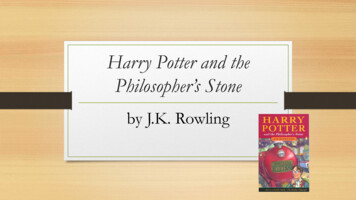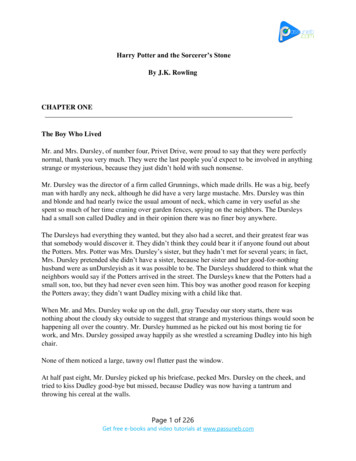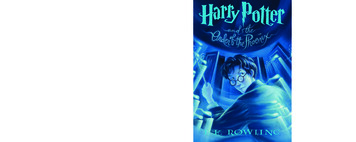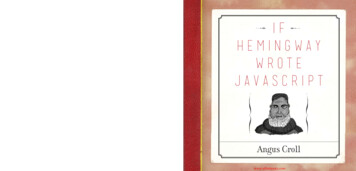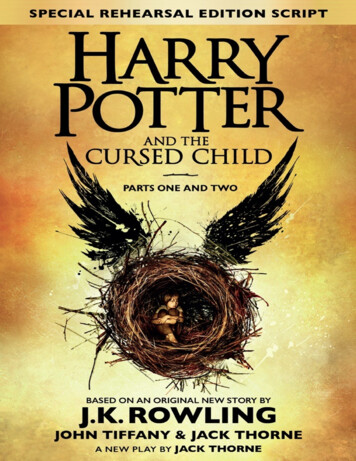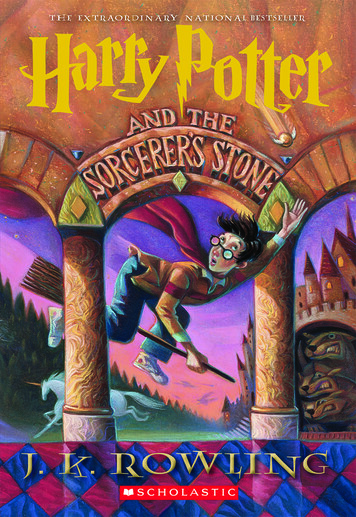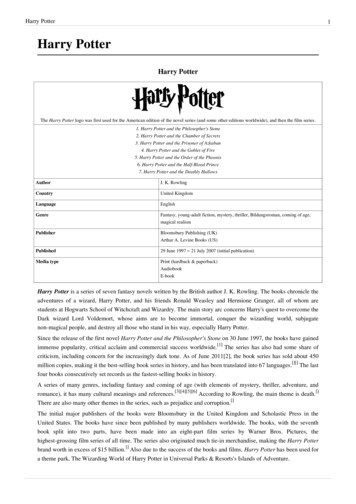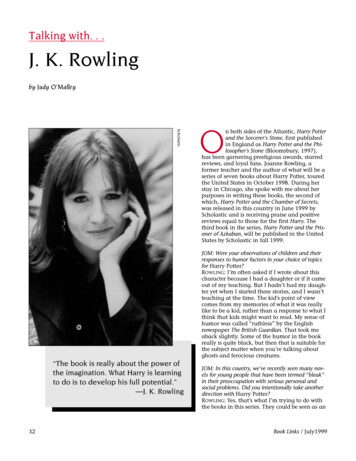
Transcription
Talking with. . .J. K. Rowlingby Judy O’MalleyScholasticOn both sides of the Atlantic, Harry Potterand the Sorcerer’s Stone, first publishedin England as Harry Potter and the Philosopher’s Stone (Bloomsbury, 1997),has been garnering prestigious awards, starredreviews, and loyal fans. Joanne Rowling, aformer teacher and the author of what will be aseries of seven books about Harry Potter, touredthe United States in October 1998. During herstay in Chicago, she spoke with me about herpurposes in writing these books, the second ofwhich, Harry Potter and the Chamber of Secrets,was released in this country in June 1999 byScholastic and is receiving praise and positivereviews equal to those for the first Harry. Thethird book in the series, Harry Potter and the Prisoner of Azkaban, will be published in the UnitedStates by Scholastic in fall 1999.JOM: Were your observations of children and theirresponses to humor factors in your choice of topicsfor Harry Potter?ROWLING: I’m often asked if I wrote about thischaracter because I had a daughter or if it cameout of my teaching. But I hadn’t had my daughter yet when I started these stories, and I wasn’tteaching at the time. The kid’s point of viewcomes from my memories of what it was reallylike to be a kid, rather than a response to what Ithink that kids might want to read. My sense ofhumor was called “ruthless” by the Englishnewspaper The British Guardian. That took meaback slightly. Some of the humor in the bookreally is quite black, but then that is suitable forthe subject matter when you’re talking aboutghosts and ferocious creatures.“The book is really about the power ofthe imagination. What Harry is learningto do is to develop his full potential.”—J. K. Rowling32JOM: In this country, we’ve recently seen many novels for young people that have been termed “bleak”in their preoccupation with serious personal andsocial problems. Did you intentionally take anotherdirection with Harry Potter?ROWLING: Yes, that’s what I’m trying to do withthe books in this series. They could be seen as anBook Links / July1999
antidote to all of the grim books. Therehas been the same trend in publishingin Great Britain. We’ve had a glut ofvery realistic, gritty, very bleak books.Some of them are brilliantly writtenand I think it would be a tragedy ifthey weren’t being written. Havingsaid that, though, I don’t think Harry isan entirely frivolous book. There aredifficult things that we see Harry gothrough—bereavement is a very obvious one—but it’s not an “issues” bookin the sense that you would sit downafter reading it and think about whatthis book deals with, what it attemptsto explain. You see Harry coming toterms with things in his life, and I hopethat all of that is integral to the story.But, it’s not meant to be the mainthrust of the story. And, I think that ina badly written realistic, gritty bookthat feeling of grinding away at apoint is stamped on every page.JOM: As you’ve heard from and spoken toAmerican children, do you find they relateas easily to your characters and setting asBritish readers do?ROWLING: Apparently they do, andreally that doesn’t surprise me. Actually, the book takes place in a very different context from even what mostEnglish and Scottish children wouldhave experienced. I wasn’t educated inboarding school and have no innerknowledge of boarding schools. I waseducated at what we call state school,a day school that you would call publicschool here. So, Hogwarts is obviouslya fantastical place. And the idea thatchildren may have to reach a bit tounderstand what a prefect is really isnot that difficult. And, humannature—and kid nature—is universal.JOM: Were many changes made by youreditor in America before the first book wasreleased here?ROWLING: My American editor, ArthurLevine—who I think is brilliant—and Iagreed on this point. We set downground rules that we would makechanges only in cases in which we boththought that what I had written wouldcreate an erroneous picture in anAmerican child’s mind. Initially, I didthink, “I don’t want them to change aword.” But then, I realized that attitudewas akin to expecting French childrenBook Links / July1999to all learn English perfectly beforethey can read my book. We translatethis and other books for people whospeak other languages and think nothing of it. But, if I use theword jumper to mean asweater, an American childwill see Harry wearing something completely differentand embarrassing for a boyto wear in this country. So, Idon’t really feel that I’m selling out my art if I changethat word. There are placesin the book where if wedidn’t make changes, theAmerican child would definitely miss the joke or missthe point, while an Italian orFrench reader wouldn’t. Thetranslator would have putthe appropriate word rightthere for them. We reallychanged very little, butevery change was for justthat reason: I felt and Arthurfelt that without suchchanges we would be tripping readers up unnecessarily.JOM: The title of the first book was alsochanged from that of the English publication, Harry Potter and the Philosopher’sStone. The substitution of Sorcerer’sStone emphasizes the focus on magic andwizardry. Have you had any reactionsfrom parents or other adults who object tothe treatment of occult subjects in yourbooks?ROWLING: I expected that same reaction in Britain, although from whatI’ve heard in the American media, Idon’t think there is quite the samedegree of anxiety about these things inBritian. If this subject offends people,that isn’t what I want to do, but I don’tbelieve in censorship for any agegroup, and this is what I wanted towrite about. The book is really aboutthe power of the imagination. WhatHarry is learning to do is to develop hisfull potential. Wizardry is just theanalogy I use. If anyone expects it tobe a book that seriously advocateslearning magic, they will be disappointed. Not least because the authordoes not believe in magic in that way.What I’m saying is that children haveRowling, J. K. Harry Potter and theSorcerer’s Stone. 1998. 320p.Scholastic, 16.95 (0-590-35340-3).33
power and can use it, which may initself be more threatening to some people than the idea that they would actually learn spells from my book.going as I write the other books. Andthat last chapter deals with what happens to the survivors afterward.Because there will be deaths.JOM: Do you think children consciouslypick up on the levels of meaning in thebook?ROWLING: Definitely some do, becauseI’ve met them. In fact, I met a boy thismorning who asked me the question Ihad thought everyone would ask mewhen the book was published, but thiswas the first time it’s come up. He saidto me, “If Harry’s aunt and uncle hatehim so much, why don’t they just throwhim out?” Well, that’s a very shrewdpoint, and it will only be explained inbook five. But, I had expected to have toexplain that on a daily basis as thebook became popular. I kept wonderingwhy no one had asked, as I would wantto know that if I were a reader. So,finally, Dennis in Chicago realized thatthis was a fundamental question thatneeds answering. He’s right, and he’llfind out in book five.JOM: Harry is very subversive in how hegets back at his terrible relatives. He’s afully developed character, not a victim orsaint.ROWLING: Yes, he wants to get back atDudley. He’s a human boy, and we thereaders want him to get back at Dudley. And, in the long term, trust me, hewill. But Harry is also innately honorable. He’s not a cruel boy. He’s competitive, and he’s a fighter. He doesn’t justlie down and take abuse. But he doeshave native integrity, which makeshim a hero to me. He’s a normal boybut with those qualities most of usreally admire.JOM: Did you know from the beginningthat Harry Potter would have to be aseries of books?ROWLING: Yes, I planned it to be a seriesfrom the very start, and when I firstmet my British editor face-to-face, Iknew that, at some point during thatfirst lunch meeting, I would have tosay, very tentatively, “Do you thinkyou might want a sequel . . . or two?Because, basically, I have plannedseven.” Bits of some of them werealready written even then, so I keptthinking, please want more. ThankGod, after the first course, he turned tome and said, “So, obviously we’rethinking sequels.” And I was sorelieved. I think I said something like,“Well, yes, I think I can probably manage one—or six.” And he was fine withthat plan. There are a couple of unexplained questions at the end of each ofthe books, so the story can go on. As Iimagine it, there will be seven years atwizard’s school, then Harry is a fullyqualified wizard and it is then that he’sallowed to use magic outside school.So, you’ll see him into his final year atHogwarts. The final chapter of the seventh book is written. That’s for my ownsatisfaction, so that I know where I’m34JOM: You must have had an essentialbelief in this character and his story fromthe very beginning?ROWLING: That’s true, and it was thefirst time I really, really believed insomething I’d written. Prior to thiswork, I’d never tried to get anythingpublished because I just knew when Iwould reread it that it wasn’t goodenough. But this book I loved morethan anything I’d ever done before. Iloved the characters so much, they justhad to grow up.JOM: Did you anticipate that the bookwould have as much appeal for adults asit does for children?ROWLING: That was a bit of a shock tome because I’d been writing for adultsbefore and the manuscripts were neverpublishable. Then, I write what I thinkis a child’s story—although really Iwrote it for me, primarily for me. Infact, when I first started writing, I thinkI was thinking too much about thechildren who would read it. So, Ithought, okay, just write it for yourself.And that was the right decision,because then, as a writer, you can’ttalk down to your audience. When fanletters started coming in to both publishers, in Britain and in the U.S.,many were from adults who weren’teven saying, “My daughter read it,”but they were saying things like, “Ibought it, I read it, I love it. Can I jointhe fan club?” And those commentsBook Links / July1999
were from a woman who was 60 yearsold. That was amazing.JOM: The complexity of the backgroundinformation in Harry Potter shows greatrespect for what the child reader willunderstand. Are you ever challenged onthat point by adults?ROWLING: Yes, people often want toknow if I think kids get everything inthe book. I say, “So what if they don’t?”They’re getting enough to enjoy it, andif they love the book, they’ll read itagain. And, if they get a joke on thesecond reading that they didn’t understand the first time through, that’swonderful. It’s another treat for them.That’s how it was for me with thebooks I read when I was very young. Icertainly didn’t understand everyword. But then I’d want to reread themwhen I could get more of the meanings. But, in any case, there are definitely children of just eight or ninewho seem to have gotten everything inthe book. The proof that we should notunderestimate children is all aroundus, but we still persist in doing it.JOM: Do children seem to pick up on thisemphasis on children gaining their ownpower and having some control over circumstances?ROWLING: I think that, in a nutshell, iswhy they like the book. It deals with avery common fantasy for a lot of children: I must be special. These peoplecannot be my parents! I think we all gothrough that to some extent. It’s just anormal part of growing up. We allwant to be different. And, howeverhappy children are, however welllooked after, children are incrediblypowerless. Someone else is always calling the shots, whether it be a parent,teacher, or older sibling. So, they lovethe idea that you can break out of that.That’s one reason Hogwarts had to bea boarding school—so the main characters would be mainly with their peerswithout parental intervention.JOM: Are you ever surprised by what people find in this book?ROWLING: I’ve had some time to standback from the first book and I can nowtalk about it far more objectively than Icould when I was writing it. I’ve hadvarious accusations leveled at me. SomeBook Links / July1999people have said that it’s very traditional. Now, there are elements in thestory that are undoubtedly very traditional. In many children’s books, youwill find the same basicpattern that occurs in fairytales. There are good reasons why fairy tales endure.They appeal to us on sucha subconscious and emotional level. I think youcould say many of thesame things about Harry.You have the changeling,you have the wicked stepparents (even though oneof them is a blood relative,in Harry’s case). You evenhave an ugly brother, in away. But I certainly did notsit down and think aboutincorporating all of thoseelements. It all came frominside. I sweated blood overthat story to make it work,but it really came from myheart. Only later can youstart analyzing it. But youcan overanalyze, too. I hada woman tell me it wasclear to her that Harry was so abusedthat he becomes schizophrenic, andthat everything that happens from thepoint of the arrival of the letters aboutHogswart is his own escape into a sortof torture-fantasy. I tried to be politeand say something like, “Well, thatwould be one way of looking at it, Iguess.” But I was kind of scared. One ofthe nicest things about writing for children is that you don’t find them deconstructing novels. Either they like it orthey don’t like it.Rowling, J. K. Harry Potter and theChamber of Secrets. 1999. 320p.Scholastic, 16.95 (0-439-06486-4).JOM: Is it a bit daunting to have had somuch popular success with the first bookwhen you know there are six more that willbe compared with it and with each other?ROWLING: Oh, yes. It was terrifying.And people are bound to have favorites. I have my favorite of the Narniabooks. And, there’s bound to be one ofthis series that people like less than theothers. I can cope with that. But, I stillfeel like I stepped through the lookingglass. I still can’t believe the book ispublished, that I’m sitting here talkingwith you about it. The scariest momentfor me was when the deal with Scholas-35
tic came through. I was getting a lot ofpublicity for the first book in Great Britain, as the book just really took off whenI won the Smarties Prize, which is probably the most prestigious English children’s book award. So, that gave it ahuge jolt, and the profile started beingraised. Then, with the sale of the book toScholastic, too, I just got incrediblyscared and was blocked for about amonth. I couldn’t write at all then, and Iwent from having been very happy withbook two to thinking it wasn’t goodenough, it didn’t match up to the firstone. Now, as I stand back from the second book, since it’s a year later and I’vejust finished the third, I think numbertwo is maybe better, in fact, than thefirst one. It’s done very well in Britainand just came out in America. And, Ihave to say that the American edition ofHarry Potter and the Sorcerer’s Stone is myfavorite. I’ve seen six different editions,and I love them all because they are allmy book. But the Scholastic cover looksmost like the way I had fantasized thatthe book would look before it was published. To me, it looks magical. It lookslike a spell book because of the colorsand the style of the illustration.JOM: Are you thinking yet about whatcomes after Harry’s last book?ROWLING: I’ve thought about it. I have afew ideas sitting in my filing cabinet athome. Maybe I’ll go back and do something with them, but maybe when I goback to them, I’ll find out they’re complete rubbish. Harry is my full-time jobat the moment. I really don’t have muchbrain space to think about otherprojects. I don’t know if whatever comesnext will be for children. But, if I end upbeing a children’s writer, that will be finefor me, because I don’t at all see children’s literature as substandard or adultbooks as a peak of achievement. But,equally, if the next idea that enthusedme this much were for adults, then I’ddo that. The things I’m best at writingare the things I absolutely adore. So, Ihave to wait for the idea to come. Somewriters can take a nutshell idea from apublisher and go away and do that bookvery well. That’s a particular kind of giftthat might stray more into journalism.But I know I couldn’t do that. The ideahas to grip me from the start like Harrydid. n36Book Links / July1999
which, Harry Potter and the Chamber of Secrets, was released in this country in June 1999 by Scholastic and is receiving praise and positive reviews equal to those for the first Harry. The third book in the series, Harry Potter and the Pris-oner of Azkaban, will be p
